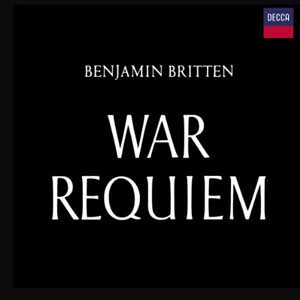 Benjamin Britten is without doubt among the foremost of modern British composers, generally considered, along with Sir Edward Elgar and Ralph Vaughan Williams, as one of the most important voices in English music of the twentieth century. It goes beyond that, actually: most commentators hold him to be one of the greatest composers of the century, sharing the limelight with such as Stravinsky, Bartók, Schoenberg, and Prokofiev. Britten began composing as a child, and never seems to have stopped: his last work, the dramatic cantata Phaedra, was composed in 1976, the year of his death. He is known particularly for his writing for the voice, especially his operas — Peter Grimes, Death in Venice, and The Turn of the Screw are considered among the masterpieces of twentieth-century opera.
Benjamin Britten is without doubt among the foremost of modern British composers, generally considered, along with Sir Edward Elgar and Ralph Vaughan Williams, as one of the most important voices in English music of the twentieth century. It goes beyond that, actually: most commentators hold him to be one of the greatest composers of the century, sharing the limelight with such as Stravinsky, Bartók, Schoenberg, and Prokofiev. Britten began composing as a child, and never seems to have stopped: his last work, the dramatic cantata Phaedra, was composed in 1976, the year of his death. He is known particularly for his writing for the voice, especially his operas — Peter Grimes, Death in Venice, and The Turn of the Screw are considered among the masterpieces of twentieth-century opera.
This is not to say that Britten’s music nor his career are at all uncontroversial, even today: he quite deliberately placed himself outside the mainstream of British music, admiring such composers as Mahler, Berg, and Stravinsky, considered somewhat questionably avant-garde in England at the time. He was also a pacifist, which during World War II was not a popular stance. And he had a fondness for adolescent boys, although there is no evidence that he ever took such a relationship beyond the purely platonic. Nevertheless, like Wagner’s anti-semitism, these sorts of things have colored reactions to Britten’s music.
Britten was one of several composers commissioned to create new works for the consecration of the new Coventry Cathedral, built alongside the ruins of the thousand-year-old church destroyed during World War II. The result was the War Requiem, recognized immediately as a masterpiece (and I see no reason to change that judgment at this point). Although essentially modernist in its approach — although not the modernism of mid-century, actually, but more the eclectic modernism of the later twentieth century — it is not as adventurous as other works by Britten. This is not to say that it is in the least humdrum: based on the Latin Missa pro defunctis, it also incorporates the poetry of Wilfrid Owen, arguably the greatest of the World War I British poets and himself a strongly anti-war voice. Britten wrote it for the soloists featured in this recording: Russian soprano Galina Vishnevskaya, German baritone Dietrich Fischer-Dieskau, and English tenor Peter Pears. And yes, the nationalities of the soloists are significant: this is, when all is said and done, one of Britten’s strongest statements on the insanity of war and the senselessness of national states.
It is also huge: we are talking about a full chorus and orchestra, in addition to two choirs and a chamber ensemble, supporting the soloists. There is also a particular spatial arrangement that doesn’t really come across all that clearly in a recording (although I have to say, it could certainly be much worse): to the front, closest to the audience, are the tenor and baritone soloists and the chamber orchestra: the victims of war, who sing the texts taken from Owen’s poetry. (This is perhaps even more poignant when you know that the poet himself was killed a week before the Armistice was signed in 1918.) There is a certain immediacy here that is, to say the least, compelling. Farther back are the soprano soloist, the orchestra and the chorus, which represent the mass of humanity and present a less personal engagement, accentuated by the Latin text. More remote still (ideally offstage) are the boys’ choir and the organ; even in a recording, the sound here is ethereal, unearthly and a little chilling.
I might add that the music itself has passages to which my reaction was “No one should be allowed to write music like this — it’s too dangerous.” It is tremendously affecting, packing a potent punch without histrionics. (This is not to say that there is no theatricality: of course there is, and a great deal of intensity besides.) The final section, “Libera me . . . Let Us Sleep Now,” after several soaring passages punctuated by those chilling accents by the boys’ choir, tapers off into a stillness that you could almost feel, except you’re too busy gasping for breath. I was, anyway — I can’t believe someone can generate that much tension from near silence.
The remainder of the second disc is devoted to recordings taken from Britten’s rehearsals of the piece, unknown to the composer, and, when presented to him as a recording in honor of his birthday, very poorly received. (Britten was a notoriously private person, and felt that these “secret” recordings were an invasion of that privacy.) Despite Britten’s reaction, we do have a valuable record of the composer at work interpreting his own music — the historian’s dream.
This is a remastered version of the original 1963 recording, and it’s been cleaned up and nicely presented for a new generation, which is all to the good. It’s also a definite must for our basic library of twentieth-century masterpieces.
(Decca Records, 2006 [orig. Decca Records, 1963])
